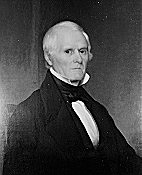Samuel Cushman
Samuel Cushman | |
|---|---|
 | |
| Member of the New Hampshire House of Representatives | |
| In office 1833–1835 | |
| Member of the U.S. House of Representatives from New Hampshire's at-large district | |
| In office March 4, 1835 – March 4, 1839 | |
| Preceded by | Joseph M. Harper |
| Succeeded by | Ira Allen Eastman |
| Personal details | |
| Born | June 8, 1783 Portsmouth, New Hampshire, U.S. |
| Died | May 20, 1851 (aged 67) Portsmouth, New Hampshire, U.S. |
| Resting place | Proprietors’ Burying Ground |
| Political party | Jacksonian Democratic |
| Spouse | Maria Jane Salter |
| Profession | Attorney Politician |
Samuel Cushman (June 8, 1783 – May 20, 1851) was an American attorney and politician in the U.S. state of New Hampshire. He served as a member of the United States House of Representatives and as a member of the New Hampshire House of Representatives in the 1800s.
Early life and career
Cushman was born in Portsmouth, New Hampshire, the son of Job Cushman and Priscilla Ripple Cushman. He attended the common schools, studied law and was admitted to the bar. He began the practice of law in Portsmouth.
He served as judge of the Portsmouth police court and as county treasurer from 1823 to 1828.[1] He was a member of the New Hampshire House of Representatives from 1833 to 1835.[2] Cushman was nominated by President Andrew Jackson to be United States attorney for the District of New Hampshire but was not confirmed.[3]
He was elected as a Jacksonian to the Twenty-fourth Congress and reelected as a Democrat to the Twenty-fifth Congress, serving from March 4, 1835 - March 4, 1839.[4] Cushman served as chairman of the Committee on Commerce during the Twenty-fifth Congress.[5] After leaving Congress, he was a United States Navy officer at Portsmouth from 1845 to 1849.[6]
He died in Portsmouth in 1851[7] and was interred in the Proprietors’ Burying Ground.[8]
Personal life
Cushman married Elsa Ann Salter in May 1813. They had eleven children. Cushman's mother died in July 1831.[9]
References
- ^ Herringshaw, Thomas William (1909). Herringshaw's National Library of American Biography: Contains Thirty-five Thousand Biographies of the Acknowledged Leaders of Life and Thought of the United States; Illustrated with Three Thousand Vignette Portraits. American Publishers' Association. p. 183.
- ^ United States. Congress (1903). A biographical congressional directory, 1774 to 1903: The Continental Congress: September 5, 1774, to October 21, 1788, inclusive. The United States Congress: the First Congress to the Fifty-seventh Congress, March 4, 1903. Govt print. off. p. 485.
- ^ Cole, Donald B. and Harvard University Press (1999). Jacksonian Democracy in New Hampshire. iUniverse. p. 88. ISBN 9781583483077.
- ^ Polk, James Knox (1979). Correspondence of James K. Polk: 1839-1841. Univ. of Tennessee Press. p. 89. ISBN 9780826512086.
- ^ Prime, Samuel Irenæus (1875). The life of Samuel F. B. Morse, LL. D.: inventor of the electro-magnetic recording telegraph. D. Appleton and company. p. 344.
- ^ Preble, George Henry (1892). History of the United States Navy-yard, Portsmouth, N. H. U.S. Government Printing Office. p. 128.
- ^ "Publications - Descriptions of Portraits of Justices and Others at the New Hampshire Supreme Court Building Concord, New Hampshire". New Hampshire Division of Historical Resources. Retrieved December 12, 2013.
- ^ Spencer, Thomas E. (1998). Where They're Buried: A Directory Containing More Than Twenty Thousand Names of Notable Persons Buried in American Cemeteries, with Listings of Many Prominent People who Were Cremated. Genealogical Publishing Com. p. 222. ISBN 9780806348230.
- ^ "Samuel Cushman". ancestry.com. Retrieved December 12, 2013.
Further reading
- "Speech of Mr. Cushman, of New Hampshire" by Samuel Cushman, 1839.

